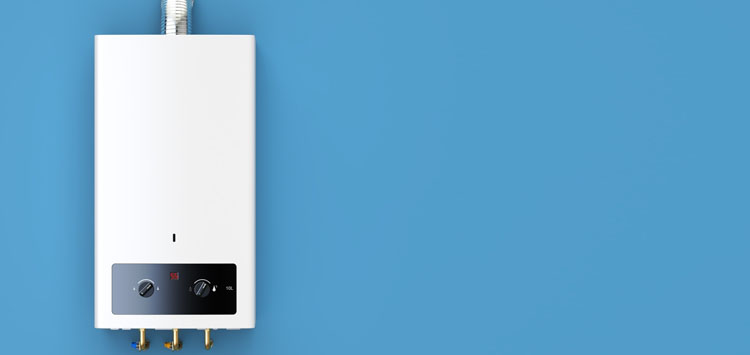If you are in the market for a new water heater, before choosing the traditional storage-tank type, it could be a good idea to check out different types of water heaters.
Due to the increase in their popularity, many people are looking for electric tankless reviews. Perhaps you are too. Before you do that, though, how do you know an on-demand water heater, as they are sometimes known, is right for you?
The Pros and Cons of Tankless Water Heaters
Sure, if you are looking at how to hide your water heater, because you don’t want the eyesore of a large heater or just don’t have space, a tankless model is a great option. However, you need to think about more than just one aspect before deciding it’s right for you and your situation.
That’s why in the following post, we have put together a guide to the tankless water heaters pros and cons. Before that, though, if you are completely new to the subject, you may need a little help in understanding what tankless heaters are.
What are They?

In these heaters, strong burners are utilized to heat the supply up quickly as it is passed through a heat exchanger as it’s directed into showers and faucets. Normally, they are powered by electricity or gas.
According to tests carried out by Consumer Groups, tankless units were noted as being 22% more energy-efficient than their traditional counterparts.
How Do They Differ From Storage Tank Heaters?

Obviously, if you are going to choose a model over a storage tank heater, you need to know why it makes a difference in the first place. As well as what are the advantages and disadvantages of a tankless water heater? and is a tankless water heater worth it?
Storage tank systems are the kind of heaters you’ll be most familiar with and normally have a specially insulated storage tank with anything from 30 to 50-gallons of water.
The supply is held in the tank is warmed and stored there, warm, until you need it. At the top of the tank, there is pipework that leads directs the supply around your home.
Much like tankless systems, storage heaters can be powered by either natural gas or electricity. Natural gas options are better as they use something in the region of 50% less fuel in comparison to electric storage tank heaters. However, it’s worth noting that the electric models are more affordable than the gas heaters.
Electric Tankless Water Heater Pros and Cons

Now that we’ve looked at what this design of heaters are and how they differ from the more traditional option of a storage tank version, it’s time to consider their various tankless electric water heaters pros and cons. No product or appliance available these days is completely perfect in every way but this information should help you find the best option for your requirements.
Therefore, the best way to assess whether something is a good fit for your home is to look at the advantages and disadvantages that come from using it. Then determining whether the disadvantages are things you can live with or not.
Pro #1: They Require Less Space than Storage Tank Option
Heaters without the storage tank, by default, are smaller than the more traditional option. Thanks to the lack of a big, cumbersome, they can be installed in some incredibly tight spaces. Especially a good option for some smaller homes, and, if need be they can even be installed on the exterior of properties depending on the circumstances.
Pro #2: Provide Supply on Demand
We’ve already referred to tankless version as their alternative name of on-demand models and that is a big advantage they have over the alternative. You don’t have to wait for the supply to heat up, it’s heated as it passes through the system. In fact, most good systems can deliver between 2 and 3-gallons a minute.
Pro #3: They Last for a Longer Amount of Time
On-demand versions can last between 20 and 30-years, double the usual lifespan of most storage choice.
Pro #4: They Save Money Over Time
Gov discovered that the choices without a tank are often more energy-efficient than their counterparts. It’s thought that they could, in theory, save around $100 a year, if they are working properly. That’s a staggering difference compared to the $34 that electric models save a year.

Con #1: They are More Expensive
The price should never be the only thing that you base buying something on and these are no different. It’s still very important to consider whether a model fits in with your budget as well as your needs.
One major downside, therefore, is the fact that they are more expensive upfront. When you factor in the price of installation, particularly if it must be retrofit to your existing property layout.
Con #2: The output is Lower than What Storage Tank Heaters are Capable of
This is especially true if you or anyone in your household ever use a few different sources at once, such as using the shower while someone does the washing up. Tankless versions tend to struggle with that kind of demand and do not produce the same level of pressure.
We hope that you have learned all tankless hot water heater pros and cons and now have an idea of what to purchase.

